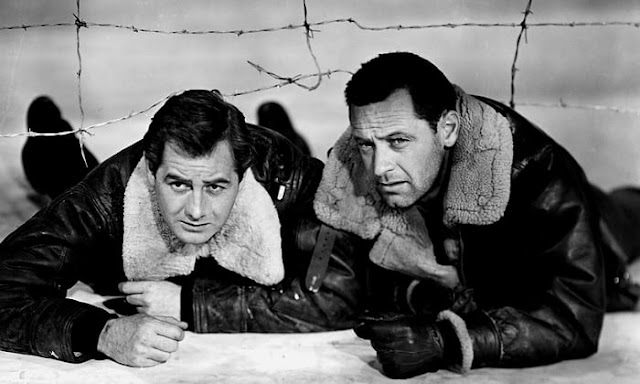Stalag 17
The men of Stalag 17, part of a German run POW camp in near Vienna have resigned their fates to conditions the Geneva Convention may raise an eyebrow or two over: cramped quarters, no showers, deplorable food. Despite this the spirits of the captured sergeants seem more up than expected; they even routinely joke with their commandant, who banters right back. I wonder if these depictions are accurate, or just Hollywood whitewash. Maybe I've seen too many films where these kinds of settings are shown to be filthier and more hellish.
1953's STALAG 17 is in fact a lighter toned war film than I was anticipating. This is not a knock on director Billy Wilder's classic. I was completely enthralled with the picture and would rank it highly among films of its era. The highly versatile Wilder directs as fluidly and brilliantly as ever, allowing amazing things within very little room for his actors to portray a fascinating social and political drama, a microcosm of society with several recognizable types. How people act and jump to conclusions in a cloister. Their dynamics of interaction follow real life to some degree, though the whole story is awfully theatrical; the movie was adapted from the same named 1951 play by Donald Bevan and Edmund Trzcinski.
The men settle into a routine, but two decide to make a break for it. Despite meticulous preparation, the would-be escapees are cut down by the guards just beyond the barbed wire fence. How did the Germans know they would be there? Why does that contraband radio get seized? Is there a stoolie among the soldiers?
Everyone's convinced the Judas is the cynical, enterprising Sefton (William Holden). A man who makes no effort to formulate escape, and regularly barters with/bribes the guards for cigarettes and eggs. He's truly content with his lot, and works the system as effectively as any good capitalist (he also runs gambling matches and a distillery within the barracks!). Sefton's coziness with the guards makes him the only suspect, coming to a head one night where the men take action against him in a scene that will remind you of a brutal moment in Stanley Kubrick's FULL METAL JACKET. .
I was surprised at how much attention and lines were given to "Animal" (Robert Strauss) and Shapiro (Harvey Lembeck), the most obvious comic relief of the story. Animal pines for Betty Grable while Shapiro brags of his appeal to women. The duo manage a ballet of absurdity in their conversations and pranks that somehow do not lead to terrible repercussion. Wilder also, in the third act of his movie, interrupts the building tension of the inevitable confirmation of who the snitch really is, with a lengthy dance between his clowns: Animal drunkenly believes Shapiro (who's in drag) is Miss Grable. In lesser hands, this scene would've diminished the power of the movie, but we have instead a skillful merge of WW2 potboiler, searing psychological treatise, and slaptick comedy. I used the word "versatile" for Wilder.
STALAG 17 is one of my favorite WW2 movies, but to compare it to the more sober ones is both unfair and even a disservice. Wilder's movie is the highest popcorn, the equivalent of a warm woolen blanket and a hot cocoa (with a splash of scotch).



Comments